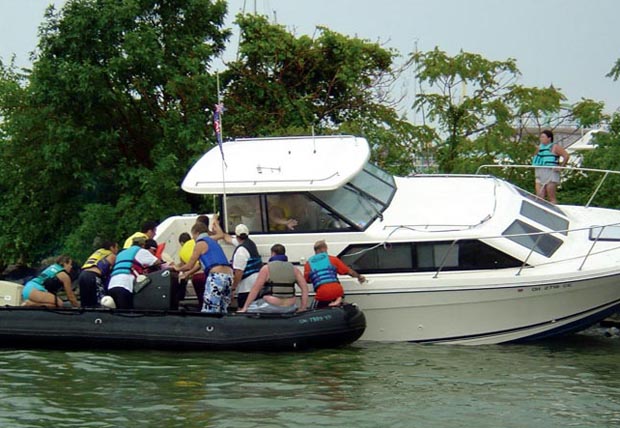Eleven Top Causes of Boating Accidents
By Randy Vance
[dropcap]…[/dropcap]oating accidents make the news for some reason — even when auto accidents don’t. There seems to be something more out of the ordinary, and thus newsworthy, about encountering tragedy while having fun than, say, while driving to the grocery. But when you examine boating accidents and their causes, you find that most of the worst of them actually stem from the most mundane events.
1. Running Out of Gas
Running out of gas on the highway is no biggie. Call AAA. Even on the water, you can often call one of the towing agencies and it’ll bring you enough fuel to get you to port for a fair fee. But run out of gas in the middle of the Gulf Stream or at the headwaters of Niagara Falls — it’s happened more than you care to guess — and the situation can fast become dire. In the Gulf Stream, unless you have an EPIRB or satellite phone, or unless someone is in range of your VHF, you could be stranded indefinitely. How can this happen, you ask? Well, you can miscalculate your return bearing and find yourself far from the inlet and far beyond your fuel range. Or you may have to skirt unexpected storms or even run offshore to avoid them. So, before you leave the dock, take stock of what you plan to do. Calculate the fuel you think you’ll need to go out, play or fish, and return safely to port. Then add 10 to 20 percent more. If I’m going 25 miles offshore to fish, I figure 15 gallons out, 15 gallons back and 15 gallons to fish. Then I add an additional 5 to 10 gallons for a safety margin.
2. Running Aground
Usually, grounding your boat is only an embarrassment — but not always. I used to commute by boat from home to our resort and marina on Lake of the Ozarks. At least once per summer, I’d come upon a boat far up in the woods on an early Sunday morning. The partyers had been out late the night before, drinking too much, driving too fast and missing the cues that they were coming up on hard ground. On one occasion the boat — visible through the swath it had cut through the trees until a big oak stopped it — was clearly bloody. It’s not the grounding that hurts you — it’s the sudden stop. Many times grounding leaves you in the water but on a sandbar. Too many boaters are eager to yank their craft off the rocks and end the humiliating saga. But don’t do it until you’ve gone below to make sure the bilge is not filling with water through a crack in the hull. It’s better to be safely aground than sinking. 3. Falling Overboard Falling overboard is another event that’s usually little more than a short-lived — albeit wet — humiliation. But if you hit your head on the way out of the boat and knock yourself unconscious, you won’t float face up. Wear a life jacket. Of particular danger to solo boaters who fall overboard is that the vessel is likely to continue on without you until it runs out of gas. Some boats turn in a hard circle, surrounding you in wakes and threatening to run you down. Wear the emergency cut-off switch lanyard so that, if you are tossed from the helm, the boat stops in its tracks.
4. Sinking
The most likely cause of sinking is laughably simple: a hole in the boat. How do they get there when you’ve never hit anything? Through-hull fittings. They bring water in or out through the hull, and these connections are vulnerable. Bronze through-hulls are best, but stray electrical current in the water from other boats or from pier wiring can dissolve them. Plastic through-hulls are vulnerable to a mechanic’s misstep — one could break substantially and begin leaking later, only when the boat begins cruising in rough waters. Wiggle the through-hulls, looking for loose connections or other damage. Also, inspect the bilge before departing, and make sure the bilge pump is working properly and the garboard plug—many call it the bilge plug—is in place. Keep available a handful of wooden bungs (tapered pegs you can pound into a broken through-hull to stop the water).
5. Catching Fire
Fire on board is becoming increasingly rare, since boats are built with more-spark-protected mechanical systems and double-clamped fuel lines, but it still happens. I’ll never forget a group of partyers that rented one of our boats. They took off smoking and returned hours later with beer cans strewn through the boat; they’d acquired their brews after departing. When the boat slid into the slip, it was apparent it had had a catastrophic fuel leak. Gas had dissolved the carpet glue and it was drenched with fuel. Fumes glistened above the gunwale, and, to my horror, two of the boaters had cigarettes dangling from their lips. They were clearly too drunk to understand the danger they were in. Always sniff the bilge for stray fuel fumes before departing. Look for signs of leakage like obvious fuel on the bottom or a rainbow-like slick on bilge water, and never start a marine engine without running the bilge blower at least five minutes. Make sure you have the proper fire extinguishers on board for fuel or electrical fires, and make sure they remain charged from season to season. Have them inspected by a fire department, or simply replace them if the charge gauge drops out of the green.
About Randy Vance
Randy Vance is a lifelong boater with an extended background in recreational boating and recreational marine communications. For over ten years, he was the editor in chief of Boating Life magazine and also assumed the helm of Boating magazine. Randy’s passion for boating journalism and communicating the fun and adventure of have been his career objective.




